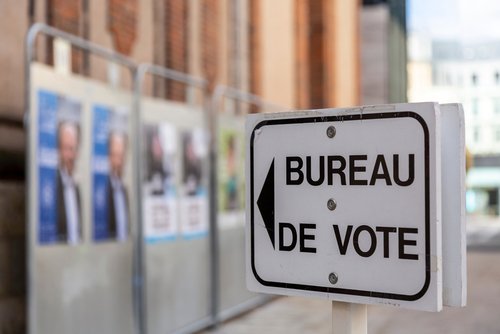Paris (Brussels Morning) It was the lowest turnout in the history of French elections, bar referendums, that saw the parties of the supposed main contenders for the presidency losing considerable ground against their long-established political rivals.
President Emmanuel Macron’s movement, La Republique En Marche (LREM), struggled to reach 10% nationally on its first participation in a regional ballot. Meanwhile, Marine Le Pen’s Rassemblement National (RN), with only 19% nationwide, lagged far behind its 2015 results (27%) and its leader’s aspirations.
A high abstention rate made the mainstream left (Parti Socialiste – PS and ecologist, left alliances) and rightwing (Les Republicains – LR) the winners of this first round, adding another layer of unpredictability to an already blurred political picture, just 10 months before the presidential election in April 2022.
Abysmal abstention
Political scientist and SciencesPo Professor Pascal Perrineau distinguishes long-term structural as well as short-term factors to help explain the record abstention rate of 66.7% – which hit 87% among the 18-24 age group and neared 99% in certain constituencies. On the one hand, following a year where COVID-19 has confined people to their private sphere, the “deconfinement politique” or readapting to public sphere activities such as politics and elections will take time.
On the other hand, a long-term structural factor concerns a certain “civil apathy”, which has characterised all French elections during the past 20 years. This reflects a public disdain towards power in all its political colours; as right and leftwing governments have succeeded each other, voters have seen no real improvement in their daily conditions, which become even more uncertain under worldwide challenges like climate change, migration flows and globalisation. Within the context of uncertainty accentuated by the pandemic, the electorate’s frame of mind tends more towards disenchantment than rage.
Thus, political apathy did not benefit the political extremes, as is often argued. On the contrary, Perrineau adds, the record abstentions were a form of protest vote against the whole political spectrum. Both the RN and the France Insoumise (far left, led by Jean-Luc Melenchon) parties drew rather disappointing results, defying predictions of their gaining ground in French society.
Furthermore, this abstention underlines the failure of the recent shift in the French political scene. By sidelining the traditional left-right powers, Macron’s attempt to position himself in the centre to draw support from both sides against the extremes has failed to convince voters to support his movement in its first, region-level test.
The results also highlight the diehard aspect of the traditional leftwing and rightwing powers against the “Macronist” experiment. Perrineau notes that their respective gains in the ballot and the retention of regions seen as their strongholds, reminds us that the new world depicted by Macron has struggled to reinvent itself against the old.
While Emmanuel Macron and Marine Le Pen found it difficult to mobilise their base and make further gains in order to test their appeal ahead of 2022, the traditional right and left alliances have reason to celebrate their return to centre stage after years of a public debate monopolised by LREM and RN.
The LR and PS-led alliances emerged as the two strongest powers on the regional and departmental level, sharing similar percentages nationally (29 and 33% respectively). But the maintenance of their strongholds was also combined with losses in other regions, while these gains cannot be automatically translated into presidential scenarios. Alternatives to the widely speculated Macron-Le Pen duel are emerging from both sides, but internal rivalries make it too early to discern one leading personality among many, in both the LR and the PS.
The “front republicain”
Another key point of this round is that the ‘front republicain’, or the call to support any candidate who stands against the RN, is still a pertinent notion if the risk of an RN victory is high.
This was mainly the case for Emmanuel Macron in the Hauts-de-Seine region where the LREM list has been disqualified since the first round, gaining only just over 9% of the votes. Next Sunday, Macron will be compelled to vote for incumbent LR candidate Xavier Bertrand in a blocking vote against RN. A humiliating outcome, as the impressive 41.3% that Bertrand scored in the first round means he would not largely depend on the LREM vote to win his re-election. It also adds serious leverage to his presidential aspirations and makes him a strong contender for the LR investiture against his rivals Valerie Pecresse and Laurent Wauquiez, both of whom are projected to win in their respective regions next week, and to seriously challenge the Le Pen-Macron duel next year.
In Provence-Alpes-Cote d’Azur (PACA), the only region where the RN candidate came first, the emergence of the ‘front republicain’ had painful consequences for the leftwing candidate, in the same way as in the 2015 election. After facing pressure from his own Ecologists and the Socialist party, Jean-Laurent Félizia announced the withdrawal of his list from the second round in order to prevent Marine Le Pen “from making PACA the footboard of her disastrous ambitions. Believe that it pains nobody more than me to tell you this evening that I will vote next Sunday for Renaud Muselier (LR) to beat Thierry Mariani (RN) and his sad cohorts” he tweeted.
The rounds of the presidential election may now be brought forward to the 10 and 24 April 2022, due to constitutional constraints and the public holidays of 1 and 8 May. This remains to be formally announced following the council of ministers on 30 June, a few days after the second round. As for the pair that will face off on 24 April, Perrineau notes of the current predictions that “we generally, mostly get it wrong”. Will it be another Le Pen-Macron duel? “It is certainly a possible scenario, but not necessarily the most probable”.




